Paragraph 1: Nvidia Under Investigation in China
Nvidia, a leading technology company specializing in graphics processing units (GPUs), found itself facing scrutiny from Chinese regulators as the State Administration for Market Regulation (SAMR) initiated an antitrust investigation into the company’s 2020 acquisition of Mellanox Technologies, a prominent computer networking equipment provider. The $7 billion deal, initially approved by the Chinese government with certain conditions, has now become the subject of a probe, sending ripples through the financial markets and raising concerns about potential implications for Nvidia’s operations in China. The investigation adds another layer of complexity to the company’s regulatory landscape, as it already faces antitrust inquiries in the United States related to its acquisition of the startup RunAI and other aspects of its chip business.
Paragraph 2: The Mellanox Acquisition and Its Strategic Significance
The acquisition of Mellanox Technologies in 2020 marked a significant strategic move for Nvidia, bolstering its presence in the high-performance computing (HPC) and data center markets. Mellanox’s expertise in networking solutions complemented Nvidia’s GPU technology, creating synergies and expanding the company’s product portfolio. The acquisition allowed Nvidia to offer a more comprehensive suite of solutions for data centers, cloud computing, and AI applications, strengthening its position in these rapidly growing sectors. However, the deal now faces scrutiny in China, raising questions about its potential impact on competition and market dynamics.
Paragraph 3: China’s Regulatory Scrutiny and Conditions for Approval
The Chinese government’s initial approval of the Mellanox acquisition came with specific conditions aimed at mitigating potential antitrust concerns. Nvidia was required to provide rivals with timely access to information about new products developed by Mellanox, ensuring a level playing field and preventing the company from leveraging the acquisition to stifle competition. Additionally, the agreement stipulated that Chinese chip companies would be able to seamlessly integrate their products with Mellanox’s technology, safeguarding their access to essential networking infrastructure. The current investigation suggests potential concerns about Nvidia’s compliance with these conditions, adding to the uncertainty surrounding the deal’s future.
Paragraph 4: Market Reaction and Investor Concerns
News of the Chinese investigation triggered a negative market reaction, with Nvidia’s shares sliding in early trading. The uncertainty surrounding the probe’s outcome and potential implications for Nvidia’s business in China weighed on investor sentiment. The company’s recent meteoric rise, fueled by the booming AI market and increasing demand for its GPUs, has made it a prominent player in the technology sector. However, the regulatory challenges it faces both in China and the US pose significant risks to its growth trajectory and investor confidence.
Paragraph 5: The Broader Context of US-China Tech Tensions
The investigation into Nvidia unfolds against the backdrop of escalating tensions between the US and China, particularly in the technology sector. The Biden administration’s recent expansion of restrictions on the sale of advanced technology to China, including certain chips and machinery, has heightened the geopolitical stakes. China’s response, which included banning the export of rare minerals to the US and imposing sanctions on US defense companies and executives, underscores the escalating trade war between the two economic giants. Nvidia, as a major player in the semiconductor industry, finds itself caught in the crosshairs of this conflict, facing challenges to its global operations and supply chains.
Paragraph 6: Nvidia’s Future Outlook and Challenges
Despite the recent setbacks, Nvidia remains a dominant force in the technology industry, driven by the continued growth of AI and the increasing demand for its GPU technology. The company’s leadership in high-performance computing and its expanding presence in data centers position it well for future growth. However, the regulatory challenges in China and the US, coupled with the broader geopolitical tensions, create significant headwinds. Navigating these complex and interconnected challenges will be crucial for Nvidia’s continued success and its ability to maintain its leadership position in the ever-evolving technology landscape. The outcome of the Chinese investigation, as well as the resolution of the US antitrust inquiries, will play a pivotal role in shaping the company’s future trajectory and its ability to capitalize on the opportunities presented by the rapidly expanding AI and technology markets.



